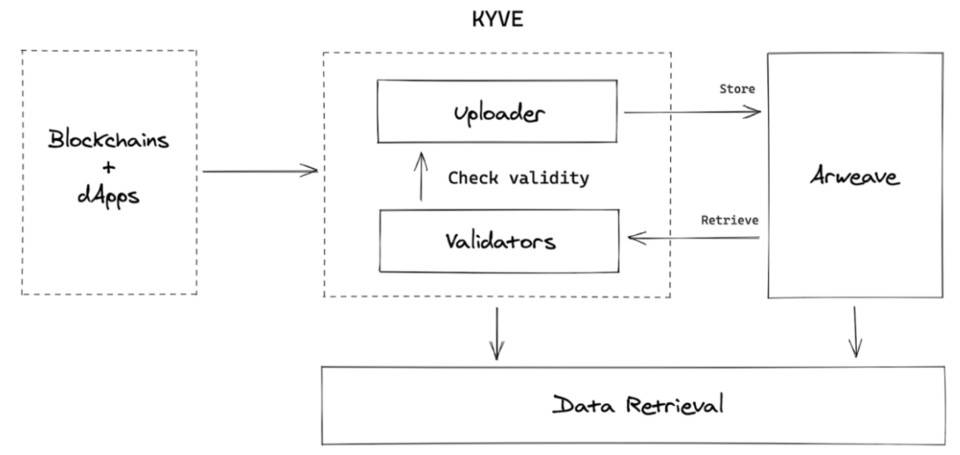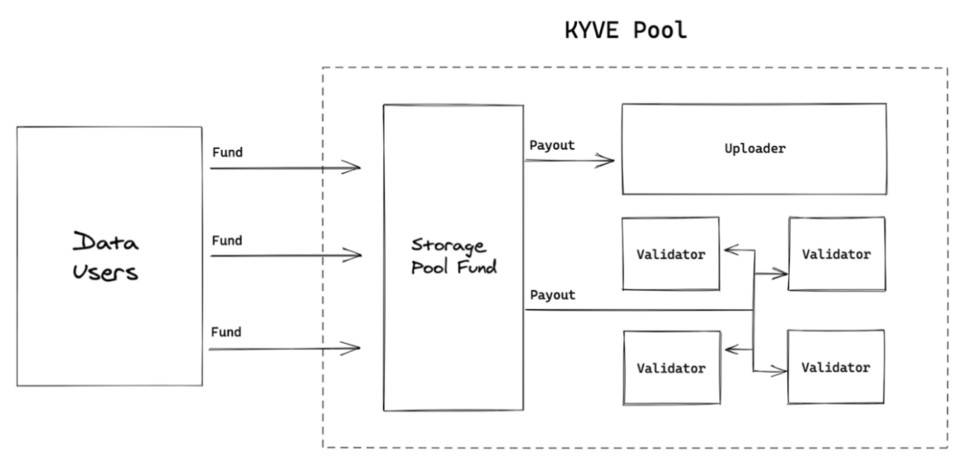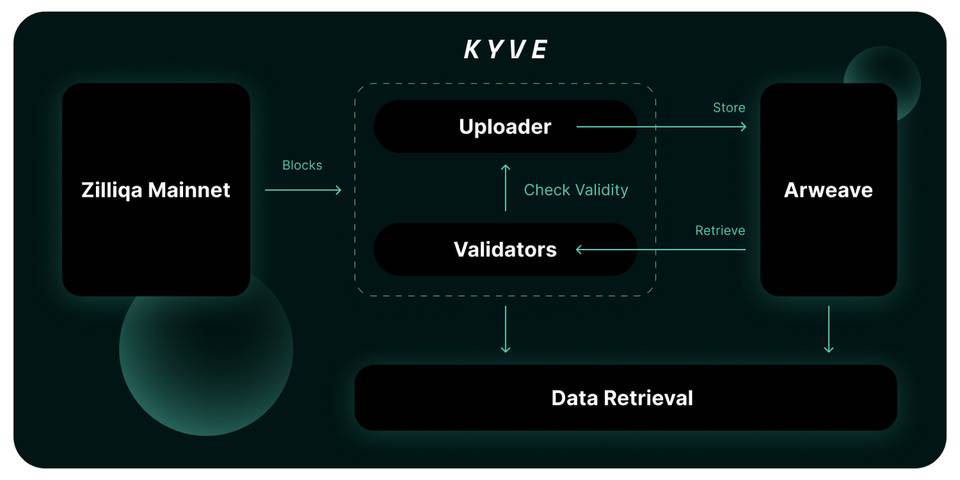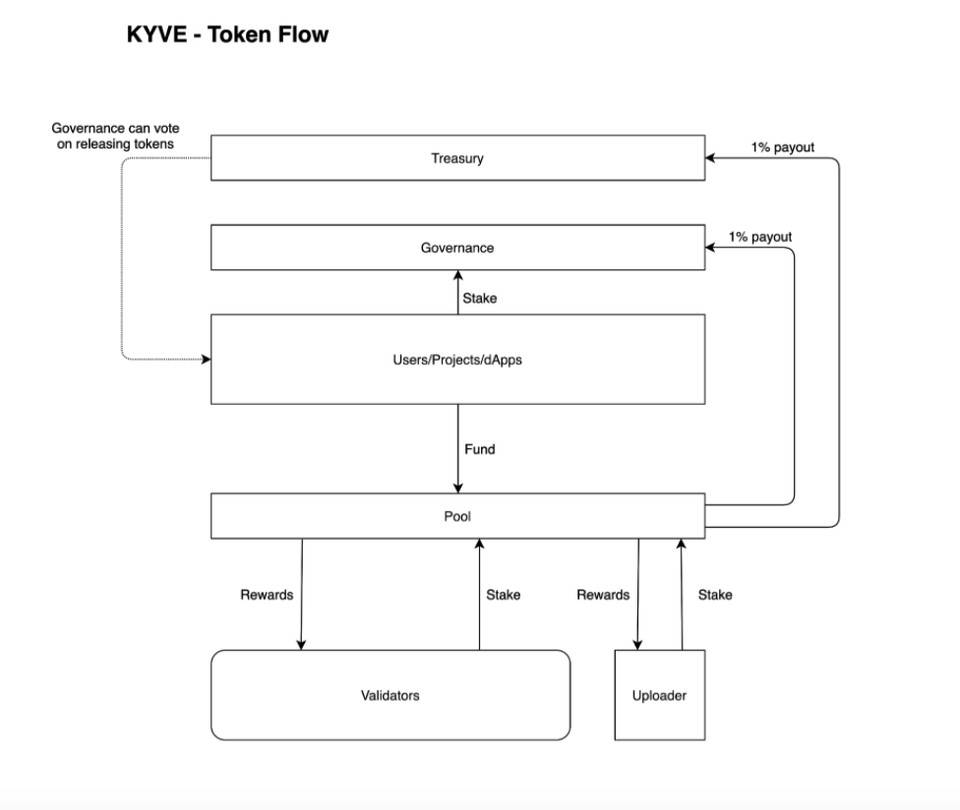Understand KYVE in Five Minutes: Cross-Chain Storage Middleware Based on Arweave
Written by: Li Ke
KYVE is a blockchain storage middleware built on Arweave, providing a unified solution for all blockchain data needs through its standardized verification and archiving framework. According to the KYVE team, the project aims to help various blockchain projects achieve convenient on-chain permanent storage and retrieval of data without the need for customization and development work, thereby enabling Web 3.0 projects to achieve infinite scalability.
What is the Value of KYVE?
Currently, blockchain infrastructure is still quite imperfect, especially in terms of blockchain data retrieval. Retrieving large amounts of data on-chain is a heavy task that requires powerful computing capabilities and considerable time. For example, synchronizing a full node on Ethereum takes a long time because it requires recalculating the entire transaction history.
There are currently no mature projects that can provide flexible and structured data access services across different blockchains without the need for custom development work, so a unified solution is needed to address data storage and retrieval issues. This is the pain point that blockchain storage middleware like KYVE needs to solve.
Why Choose Arweave Public Chain
KYVE is a project within the Arweave ecosystem, using Arweave as its underlying layer.
Arweave is one of the most competitive and user-friendly decentralized storage blockchains available today. Arweave features a one-time payment model for permanent storage, aiming to establish a digital archive akin to the legendary Library of Alexandria. Currently, most NFTs in the Solana ecosystem are stored on Arweave, and platforms like Opensea and Mintbase have partnered with Arweave for NFT storage.
Unlike Filecoin's pay-per-time model, Arweave's biggest feature is its one-time payment for permanent data storage, and Arweave believes that the cost of data storage will gradually decrease, similar to Moore's Law.
Arweave utilizes the RadomX algorithm and a set of economic incentive rules to enable miners to store data long-term. The more blocks a node stores, the more likely it is to gain the right to package blocks and receive block rewards. Additionally, Arweave has developed a Profit Sharing Community (PSC) and issued Profit Sharing Tokens (PST). PST token holders can receive transaction tips billed in Arweave's native token, AR.
Main Functions of KYVE
- Solve Arweave's scalability issues
- Upload and verify data through a standardized framework
- Achieve cross-chain data storage
Solving Arweave's Scalability Issues
Although Arweave's smart contract, SmartWeave, is decentralized, it has a significant drawback: its client-side execution can lead to scalability issues in the long run. When a contract undergoes thousands of interactions, each time the client calculates the latest state of the contract, it must traverse every previous interaction. For large contracts, this process can sometimes take a long time.
KYVE nodes can compute the latest state of the contract and provide it for other users. In KYVE's design, users stake KYVE tokens to ensure the security of the uploaded state while maintaining decentralization, allowing users to retrieve the latest state of any smart contract within seconds.
KYVE accelerates and scales Arweave in this way: KYVE provides data validity, while Arweave provides data availability. With Arweave, data can be permanently stored, and with KYVE, data storage becomes convenient, reliable, and error-free.
Uploading and Verifying Data Through a Standardized Framework
Data providers can establish storage pools to store and verify their data, with each pool being a DAO organization supported by Arweave's SmartWeave smart contract.
Uploaders and verifiers ensure the validity of the data stored in each pool, where:
- Data uploaders obtain data from the source and perform computational work before storing it on Arweave.
- Verifiers ensure the integrity of the data and vote to penalize data uploaders who do not comply with the rules.
Once the data is stored, it can be easily retrieved using KYVE's query interface or accessed directly on Arweave. Through KYVE's verification and Arweave's permanent storage, the integrity of the data provided to downstream users is guaranteed.
In the overall design of the system, when establishing a storage pool, each pool requires staking KYVE tokens. Through staking KYVE tokens, misconduct will be penalized, while proper storage will be rewarded, ensuring the effectiveness and compliance of data storage.
Achieving Cross-Chain Data Storage
To achieve its goal of becoming a blockchain data storage middleware, KYVE plans to integrate with public chains such as Solana, Arweave, Cosmos, Polkadot, Zilliqa, Avalanche, and NEAR for cross-chain data storage. Currently, it has been officially announced that Avalanche and Zilliqa are among the public chains being integrated.
By integrating with other public chains, KYVE can permanently store blocks and transaction data from other blockchains on Arweave. The connected public chains can also interact with other public chains on KYVE, and Arweave's decentralized nature ensures the integrity and security of the data. Furthermore, KYVE guarantees the reliability and availability of the data through a set of incentive and penalty mechanisms, achieving cross-chain data storage while ensuring data reliability.
KYVE's Contract Architecture
KYVE's governance architecture consists of three independent smart contracts:
Governance Contract
Through the governance smart contract, users can stake KYVE. After staking KYVE, users can participate in voting on the protocol. Users can also earn tokens as rewards, with the amount of reward tokens depending on the amount staked.
Treasury
The treasury extracts 1% from all user fees in the storage pools as treasury storage. Governance users can vote to withdraw or burn tokens from the treasury.
Storage Pool
Uploaders and verifier nodes must stake KYVE tokens in the pool. Once an uploader uploads data to the pool, verifiers will retrieve and validate the data. The contract pays token rewards to governance token holders, the treasury, uploaders, and verifiers. For specific governance architecture and token flow, please refer to the diagram below:
Project Progress
KYVE launched its project in March this year and completed a $1 million seed round financing in June, led by Permanent Ventures, which focuses on investments in the Arweave ecosystem. Other participants include Hypersphere Ventures, 4SV, Compute Ventures, Lemniscap, Bering Waters, Mechanism Capital, D1 Ventures, and Volt Capital.
Additionally, several well-known angel investors participated in this round, including Mark Heus, Farid Rached, Christian Stroh, Emanuel Ferm, Scott Moore, Kenneth Ng, Ilia Polosukhin, and Tate Berenbaum.
Notably, some core public chain project foundations also contributed funding in this round, including the Arweave Foundation, Avalanche Foundation, Interchain Foundation, NEAR Foundation, and Solana Foundation.
After six months of development, KYVE has launched its testnet and is continuously improving its technology and user experience. Currently, KYVE is integrating with other public chains and has opened data storage pools for Avalanche, Solana, Octopus Network, Redstone, Celo, and Koii.
According to the development plan, KYVE aims to stabilize the testnet further, improve the UI/UX of the contract architecture, and plans to launch the mainnet in the coming months.














